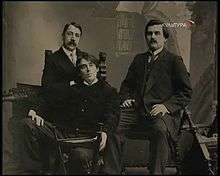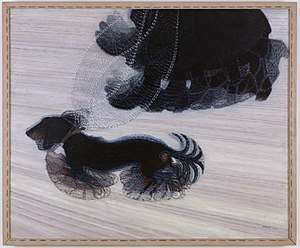Aleksei Kruchyonykh
Aleksei Yeliseyevich Kruchyonykh[1] (Russian: Алексе́й Елисе́евич Кручёных; 9 February 1886 – 17 June 1968), a well-known poet of the Russian "Silver Age", was perhaps the most radical poet of Russian Futurism, a movement that included Vladimir Mayakovsky, David Burliuk and others. Together with Velimir Khlebnikov, Kruchenykh is considered the inventor of zaum. Kruchyonykh wrote the libretto for the Futurist opera Victory Over the Sun, with sets provided by Kazimir Malevich. He married Olga Rozanova, an avant-garde artist, in 1912; four years later, in 1916, he created his most famous book, Universal War.
Aleksei Kruchyonykh | |
|---|---|
 Mikhail Matyushin (left), Kruchenykh (middle) and Kazimir Malevich (right) at the First All-Russian Congregation of the Bards of the Future (The Futurist Poets) meeting in March 1912. Photo by Karl Bulla. | |
| Born | Aleksei Yeliseyevich Kruchonykh February 9, 1886 Olevka, Kherson Governorate, Russian Empire |
| Died | June 17, 1968 (aged 82) |
| Nationality | Russian |
| Known for | Poetry, Collage, Artist's book |
Notable work | Universal War, 1916 |
| Movement | Russian Futurism, Zaum |
He is also known for his Declaration of the Word as Such (1913): "The worn-out, violated word "lily" is devoid of all expression. Therefore I call the lily éuy – and original purity is restored."[2]
The Russian punk band Grazhdanskaya Oborona have a reggae-styled song called "Posveshtenie A. Kruchyonykh" (Homage to A. Kruchyonykh) on their 1990 concept album Instruktsiya po vyzhivaniyu.
References
- Also romanized Kruchenykh, due to confusion about ⟨ё⟩
- George Steiner, After Babel, III, 3.
External links
| Wikimedia Commons has media related to Aleksei Kruchyonykh. |
- On Kruchyonykh (in English)
- Kruchyonykh in Tiflis (from Chapter Nine of G. Janecek, Zaum: The Transrational Poetry of Russian Futurism) (in English)
- Biography and poems (in Russian)
- Biography, bibliography (in Russian)
- Four zaum poems (in Russian)
- Visual Poems 1917 - 1921
- Digitized Russian avant-garde books
- English translations of 4 poems
- Includes English translations of two poems, 118-120
